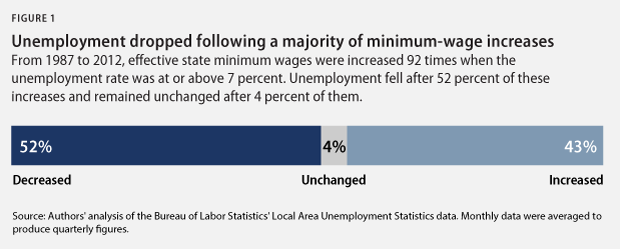As the debate heats up in Congress over increasing the federal minimum wage from $7.25 per hour to $10.10 per hour, critics of the minimum wage are trotting out the same tired arguments that doing so will harm the national economy and increase unemployment. A review of the most recent evidence makes clear, however, that raising the minimum wage does not result in inevitable job losses—even during periods of high unemployment—and may in fact be good for the economy.
The easiest way to illustrate this point is simply to look at how unemployment rates have responded to past minimum-wage increases. To do so, we analyzed more than two decades’ worth of minimum-wage increases in U.S. states; we found no clear evidence that the minimum-wage increases affect aggregate job creation when unemployment rates are high.
Our analysis included every state that saw its effective minimum wage increase between 1987 and 2012 when the state’s unemployment rate was at or above 7 percent. In 48 of the 92 times this occurred, the unemployment rate actually decreased over the next 12 months, and in 4 other cases, the unemployment rate remained unchanged.* In contrast, there were only 40 instances when the unemployment rate increased. That means when a minimum-wage increase occurred during a period of high unemployment, unemployment rates actually declined 52 percent of the time.
The fact that the nation’s current unemployment rate of 6.6 percent is actually well below the threshold used in our analysis suggests that there is even less reason to be concerned about negative employment effects.

While this basic state-by-state comparison starkly illustrates the flaws of overly simplistic arguments that claim minimum-wage increases inevitably result in higher unemployment, it alone cannot identify the causal impacts of minimum-wage increases on employment. This is because a host of other economic factors besides minimum-wage policies—such as decades-long industrial restructuring processes and divergent population trends—also affect unemployment rates and must be taken into account before arriving at any definitive conclusion.
Fortunately, a number of academic studies utilize research designs that control for such factors; among these there exist at least five that include periods of high unemployment in their samples. These five studies cover different geographical areas and different time periods and use a range of methodologies—from small case studies to large econometric analysis—lending great credibility to their findings. But despite their varying methods, all came to the same conclusion: Raising the minimum wage has no discernable effect on employment levels.

Contrary to most of the rhetoric, the results of these studies are not surprising to those who understand how the minimum wage affects the labor market. The minimum wage may make some employers reluctant to hire—as critics maintain—but the many positive effects of the policy counteract this negative effect. A higher minimum wage creates new customers by boosting demand and also lowers some costs for employers by, for example, reducing turnover. Furthermore, such wage hikes are particularly beneficial to working women and can cut the costs that low-road employers impose on taxpayers.
In short, the evidence shows that the U.S. economy has much to gain from increasing the minimum wage to $10.10 and comparatively little to fear. Policymakers should feel confident that raising the minimum wage will not hurt employment, and they should immediately take the steps necessary to ensure that all Americans are guaranteed a wage high enough to allow them to live with dignity and to contribute positively to lasting economic growth.
David Madland is Director of the American Worker Project at the Center for American Progress Action Fund. Keith Miller is a Research Associate with the American Worker Project.
* Note that figures have been updated since previous analysis was conducted in December 2013, when 91 minimum wage increases were analyzed. The overall findings of our analysis, however, remain unchanged.
Full citations for academic papers in Figure 2:
Arindrajit Dube, T. William Lester, and Michael Reich, “Minimum Wage Effects Across State Borders: Estimates Using Contiguous Counties,” The Review of Economics and Statistics 92 (4) (2010): 945–964.
Arindrajit Dube, T. William Lester, and Michael Reich, “Do Frictions Matter in the Labor Market? Accessions, Separations and Minimum Wage Effects.” Working Paper 5811 (IZA Discussion Paper Series, 2011).
David Card and Alan B. Krueger, “Minimum Wages and Employment: A Case Study of the Fast-Food Industry in New Jersey and Pennsylvania: Reply,” American Economic Review 90 (5) (2000): 1397–1420.
Lawrence F. Katz and Alan B. Krueger, “The Effect of the Minimum Wage on the Fast-Food Industry,” Industrial and Labor Relations Review 46 (1) (1992): 6–21.
Sylvia A. Allegretto, Arindrajit Dube, and Michael Reich, “Do Minimum Wages Really Reduce Teen Employment? Accounting for Heterogeneity and Selectivity in State Panel Data,” Industrial Relations 50 (2) (2011): 205–240.